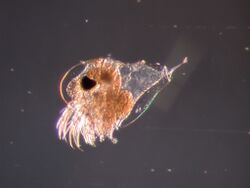Biology:Onychopoda
| Onychopoda | |
|---|---|

| |
| Evadne spinifera | |
| Scientific classification | |
| Domain: | Eukaryota |
| Kingdom: | Animalia |
| Phylum: | Arthropoda |
| Class: | Branchiopoda |
| Superorder: | Diplostraca |
| Order: | Onychopoda Sars, 1865 [1] |
| Families | |
|
Cercopagididae Mordukhai-Boltovskoi, 1968 | |
Onychopoda are a specialised order of branchiopod crustaceans, belonging to the superorder Cladocera.
The order Onychopoda is "one of the most morphologically distinctive groups of cladocerans".[2] They have only four pairs of legs, compared to five or six pairs in Ctenopoda and Anomopoda.[3] Unusually among branchiopod crustaceans, Onychopoda share with Haplopoda the presence of segmented appendages, which are used for grasping prey.[4]
Most species of Onychopoda live in the waters of the Ponto-Caspian basin (Caspian Sea, Aral Sea, Black Sea including Sea of Azov), in remnants of the ancient Paratethys ocean.[5] Some other species live in fresh water or in the oceans, where they can be widespread.[5]
There are three families, containing 10 genera and around 33 described species, most of which are endemic to the Ponto-Caspian basin:[2]
- Cercopagididae Mordukhai-Boltovskoi, 1968 – 2 genera (Cercopagis and Bythotrephes), 14 species; Black Sea & Caspian Sea
- Podonidae Mordukhai-Boltovskoi, 1968 – 7 genera, 17 species; Pont-Caspian (Caspievadne, Cornigerius and Podonevadne) and marine (Evadne, Pleopis, Podon and Pseudevadne)
- Polyphemidae Baird, 1845 – 1 genus (Polyphemus), 2 species; fresh water
The embryos are protected by a brood pouch, which also secretes nutrients to aid their development. This may be related to the colonisation of the oceans, since the only other marine cladoceran, Penilia avirostris, has a similar pouch as a result of convergent evolution.[2]
See also
References
- ↑ J. W. Martin; G. E. Davis (2001) (PDF). An Updated Classification of the Recent Crustacea. Natural History Museum of Los Angeles County. pp. 1–132. http://atiniui.nhm.org/pdfs/3839/3839.pdf.
- ↑ Jump up to: 2.0 2.1 2.2 M. E. A. Cristescu; P. D. N. Hebert (2002). "Phylogeny and adaptive radiation in the Onychopoda (Crustacea, Cladocera): evidence from multiple gene sequences" (PDF). Journal of Evolutionary Biology 15 (5): 838–849. doi:10.1046/j.1420-9101.2002.00466.x. http://www.bioinfo.uqam.ca/bif7001/articles/BIF7001-Phylo-JEB15.pdf.
- ↑ D. R. Khanna (2004). "Segmentation in arthropods". Biology of Arthropoda. Discovery Publishing House. pp. 316–394. ISBN 978-81-7141-897-8. https://books.google.com/books?id=Hd4OEDo4gbwC&pg=PA351.
- ↑ G. Fryer (1998). "A defence of arthropod polyphyly". Arthropod Relationships. Volume 55 of Systematics Association Series. Springer. pp. 23–34. ISBN 978-0-412-75420-3. https://books.google.com/books?id=Pj-q9eHyIx0C&pg=PA26.
- ↑ Jump up to: 5.0 5.1 Stefan Richter; Anke Braband; Nikolai Aladin; Gerhard Scholtz (2001). "The phylogenetic relationships of "predatory water-fleas" (Cladocera: Onychopoda, Haplopoda) inferred from 12S rDNA". Molecular Phylogenetics and Evolution 19 (1): 105–113. doi:10.1006/mpev.2000.0901. PMID 11286495.
External links
- Podon sp. fact sheet - Guide to the marine zooplankton of south eastern Australia
- Evadne sp. fact sheet - Guide to the marine zooplankton of south eastern Australia
Wikidata ☰ Q2024726 entry
 |

